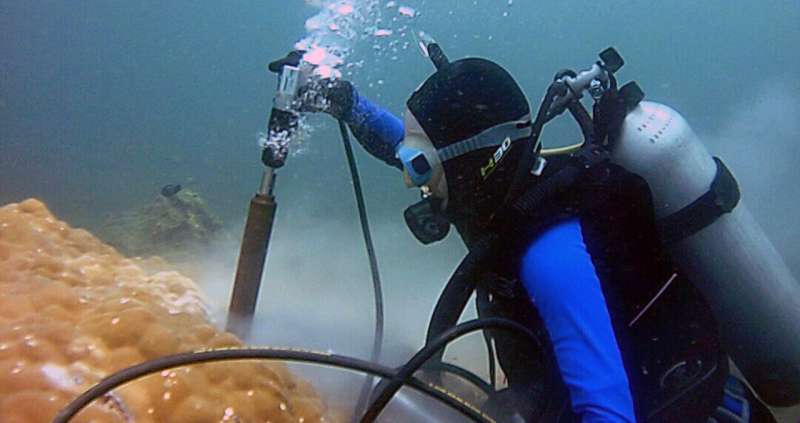Coral reefs 'weathering' the pressure of globalization

More information about the effects human activities have on Southeast Asian coral reefs has been revealed, with researchers looking at how large-scale global pressures, combined with the El Niño Southern Oscillation (ENSO) climate pattern, can detrimentally impact these delicate marine ecosystems.
The research, published in the Nature journal, Scientific Reports, provides the first long-term data on the ENSO-driven synchrony of climate impacts on both terrestrial and marine ecosystems in northern Borneo. Researchers analyzed coral reef samples to learn about regional environmental changes, including changes that have occurred during the last few decades.
Lead Australian researcher Dr. Nicola Browne, a coral ecologist from the School of Molecular and Life Sciences at Curtin University, said that over the past 40 years, nearly all of Southeast Asia's marine coastal ecosystems have experienced intense pressures, due to large-scale economic development, urbanisation and deforestation.
"The ways that humans use the land can severely impact soil contents and soil erosion patterns, which then discharge sediments into freshwater systems and nearby marine environments, ultimately altering the water quality on coral reefs," Dr. Browne said.
"Weather patterns that bring heavy rainfalls, such as those seen with the ENSO climate pattern, can exacerbate these erosion patterns even more, bringing more sediments into the local marine environments, which then ultimately end up affecting the coral reef ecosystems."
Through analyzing coral core samples from the Miri-Sibuti Coral Reefs National Park in Sarawak, Malaysia, the research team revealed decade-long, synchronous climatic impacts on the reef systems in northern Borneo, linking the El Niño Southern Oscillation climate pattern to effects shown on the area's coral reefs.
Lead researcher Ph.D. candidate Ms Hedwig Krawczyk, from the University of Leicester in the United Kingdom, explained coral cores act as a type of 'record keeper' of the local marine environments, creating fossils which researchers are able to read, interpret and then use to predict future ecosystem impacts.
"Corals incorporate geochemical tracers from the surrounding water into their skeleton, leaving behind a type of record of the marine environment at specific instances in time," Ms Krawczyk said.
"In coastal regions where there is limited, long-term environmental data, such as in Borneo, coral cores provide a critical record of local changes in river runoff and rainfall. These records help us to understand the types of pressures these reefs have been exposed to over the last 30 years, and their level of resilience to future environmental changes.
"Our study testified that both marine and terrestrial environments in Borneo are massively affected by changes in the hydroclimate associated with ENSO, and longer term cycles in regional rainfall and temperature."
The full research paper, "Corals reveal ENSO-driven synchrony of climate impacts on both terrestrial and marine ecosystems in northern Borneo," was published in Nature's Scientific Reports.
More information: Hedwig Krawczyk et al. Corals reveal ENSO-driven synchrony of climate impacts on both terrestrial and marine ecosystems in northern Borneo, Scientific Reports (2020). DOI: 10.1038/s41598-020-60525-1
Journal information: Nature , Scientific Reports
Provided by Curtin University




















